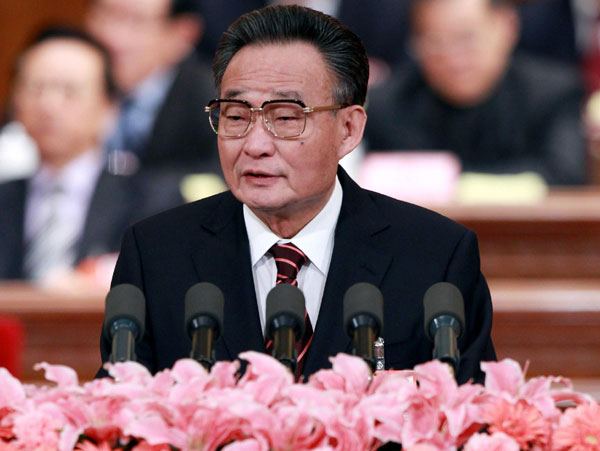Government and Policy
China to focus on revising, improving laws
Updated: 2011-03-10 17:15
(Xinhua)
BEIJING - China's top legislator on Thursday pledged more efforts to revise and improve laws and enact accompanying regulations, in addition to making news laws.
The legislative work of the NPC Standing Committee this year was to promptly revise laws incompatible with economic and social development, and to enact in a timely manner laws vital for pushing forward scientific development and promoting social harmony, he said.
According to him, laws to be revised this year include the Budget Law, Law Concerning the Prevention and Control of Occupational Diseases, Criminal Procedure Law, Civil Procedure Law, Civil Procedure Law, Organic Law of Local Governments, and Military Service Law.
The Law on Mental Health, Law on Administrative Coercion, and Law on Entry and Exit Administration are among those the NPC Standing Committee plans to enact this year.
Moreover, Wu said the NPC Standing Committee would urge relevant departments to promptly enact accompanying regulations, and do the follow-up work of reviewing laws and regulations well.
He added that a priority was to urge and guide the Supreme People's Court and the Supreme People's Procuratorate to complete the group review of judicial interpretations currently in force.
The NPC Standing Committee would deepen legislation in a scientific and democratic manner, use post-enactment assessment of laws as a new measure to strengthen and improve legislative work, and make NPC deputies and citizens to better participate in the process of legislation, he said.
Regarding the major work of the NPC Standing Committee in 2010, Wu said that it put great efforts into formulating and revising important laws that form the framework of the socialist system of laws with Chinese characteristics, and oversaw and guided relevant authorities in completing the work of reviewing existing administrative regulations and local statutes.
As a measure to establish a sound insurance-law system, the NPC Standing Committee held three times of reading of and made major revisions to the draft of the Social Insurance Law last year, he said.
The draft law clearly states in legal terms that the state shall establish social insurance systems such as pension, health care insurance, work-related injury insurance, unemployment insurance and maternity insurance, according to him.
The NPC Standing Committee passed several revisions to the Criminal Law, and one of them abolished 13 non-violent economic crimes punishable by death, or 19.1 percent of all capital crimes, he said.
These revisions also outlawed as criminal offenses actions that severely harm public interests, such as drunk driving, speeding, and wage default, and defined more specifically crimes of endangering food safety, producing and selling counterfeit drugs, and damaging the environment and resources.
"All of this resulted in a better match between punishment and crimes so that the Criminal Law can better play its role in punishing crimes, reeducating criminals, and preventing and reducing crimes," he said.
Further, Wu said the NPC Standing Committee worked hard to make legislation in a more scientific and democratic manner, citing enacting of the Vehicle and Vessel Tax Law as an example of expanded orderly participation of citizens in the legislative process.
The NPC Standing Committee made important revisions to the law's draft based on nearly 100,000 comments from the public it received in just one month after the draft's full text was publicized.
Wu said that the revised law did not increase tax on the majority of car owners, yet could help to promote energy conservation and emission reduction.
Moreover, the NPC Standing Committee launched a pilot project last year for evaluating enacted legislation, he added.
Specials

NPC & CPPCC sessions
Lawmakers and political advisers gather in Beijing to discuss major issues.

Labor crunch
Worker scarcity is no longer confined to eastern areas, minister says.

Water & Luck
People spray each other with water to express good wishes in Dongguan, Guangdong province.




